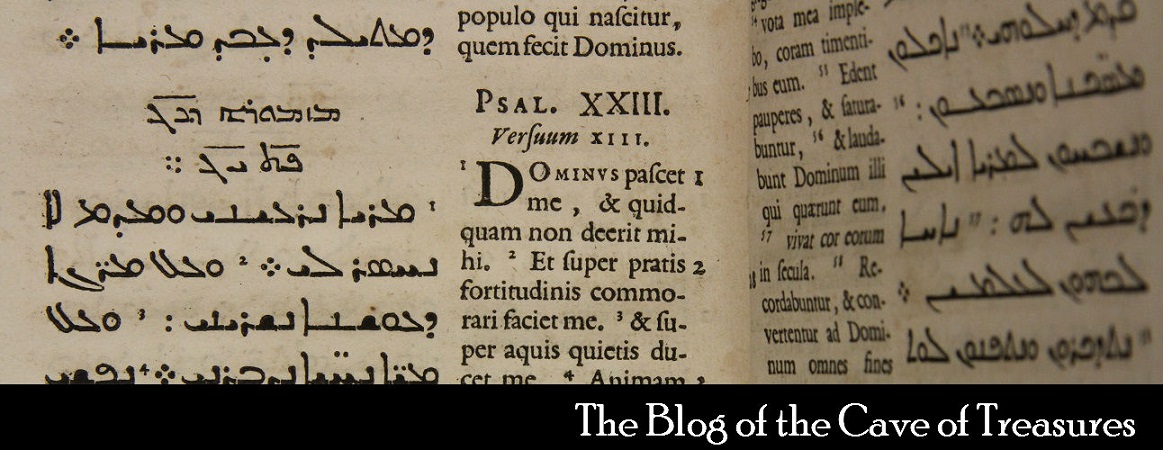Note to self:
Two excellent blogs that I need to put into my reading rotation...
https://thehiddenpearl.org/tag/syriac/
http://www.qadishat.com/
and a Maronite website to read through :
http://www.beith-morounoye.org/prayers/index2.html
Image for banner reproduced by permission from the President and Fellows of Queens' College, Cambridge. [Psalm 23 in Syriac. Psalmi Davidis, edited by Thomas van Erpe (Leiden 1625)]
Monday, December 12, 2016
Thursday, December 1, 2016
The Myth of the Pagan Origins of Christmas
"... the December 25th pagan feast of the “'Birth of the Unconquered Sun'… was almost certainly an attempt to create a pagan alternative to a date that was already of some significance of Roman Christians."
The most detailed study of this is by Thomas Schmidt at Yale. As a scholar of ancient Greek he takes into account pre-Christian writers. Look in Academia.edu and Vigiliae Christianae
http://www.intellectualtakeout.org/blog/myth-pagan-origins-christmas
-by Tom Schmidt “Sol Invictus evidently not a precursor to Christmas” Chronicon Blog, December 21, 2010. (http://chronicon.net/blog/christmas/sol-invictus- evidently-not- a-precursor- to-christmas)
The following is from "Calculating Christmas” Touchstone Magazine, by William J. Tighe, Associate Professor of History, Muhlenberg College, Allentown, Pennsylvania:
The most detailed study of this is by Thomas Schmidt at Yale. As a scholar of ancient Greek he takes into account pre-Christian writers. Look in Academia.edu and Vigiliae Christianae
http://www.intellectualtakeout.org/blog/myth-pagan-origins-christmas
Hippolytus in 202-211 AD set the date for the birth of Jesus on December 25, because he thought Jesus was conceived 9 months earlier on the Passover, the day in which he also thought the world was created (5500 years earlier), the Vernal Equinox March 25. Clement of Alexandria (193-215 AD) quoted various anonymous sources about the birth of Jesus and roughly agrees with Hippolytus, claiming that Jesus was born in late fall to early winter. Clement’s sources clearly seem to believe that Jesus was conceived on the Passover and was born roughly 9 months later; in fact the only difference between them and Hippolytus is that they differed on when the Passover actually occurred.
-by Tom Schmidt “Sol Invictus evidently not a precursor to Christmas” Chronicon Blog, December 21, 2010. (http://chronicon.net/blog/christmas/sol-invictus- evidently-not- a-precursor- to-christmas)
The following is from "Calculating Christmas” Touchstone Magazine, by William J. Tighe, Associate Professor of History, Muhlenberg College, Allentown, Pennsylvania:
As things actually happened, Aurelian, who ruled from 270 until his assassination in 275, was hostile to Christianity and appears to have promoted the establishment of the festival of the “Birth of the Unconquered Sun” as a device to unify the various pagan cults of the Roman Empire around a commemoration of the annual “rebirth” of the sun.
...the early Church followed [the Gospel of] John rather than the Synoptics, and thus believed that Christ’s death would have taken place on 14 Nisan, according to the Jewish lunar calendar. Greek Christians seem to have wanted to find a date equivalent to 14 Nisan in their own solar calendar... they chose the 14th day of Artemision [equivalent to April 6th on the Roman calendar]. In contrast, second-century Latin Christians in Rome and North Africa... concluded that he died on Friday, 25 March 29. So in the East we have April 6th, in the West, March 25th.
At this point, we have to introduce a belief that seems to have been widespread in Judaism at the time of Christ, but which, as it is nowhere taught in the Bible, has completely fallen from the awareness of Christians. The idea is that of the “integral age” of the great Jewish prophets: the idea that the prophets of Israel died on the same dates as their birth or conception.
The early Christians applied this idea to Jesus, so that March 25th and April 6th were not only the supposed dates of Christ’s death, but of his conception or birth as well...
What is the length of pregnancy? Nine months. Add nine months to March 25th and you get December 25th; add it to April 6th and you get January 6th. December 25th is Christmas, and January 6th is Epiphany.
Christmas (December 25th) is a feast of Western Christian origin. In Constantinople it appears to have been introduced in 379 or 380. From a sermon of St. John Chrysostom, at the time a renowned ascetic and preacher in his native Antioch, it appears that the feast was first celebrated there on 25 December 386. From these centers it spread throughout the Christian East, being adopted in Alexandria around 432 and in Jerusalem a century or more later.
Thus, December 25th as the date of the Christ’s birth appears to owe nothing whatsoever to pagan influences upon the practice of the Church during or after Constantine’s time.
Subscribe to:
Posts (Atom)

